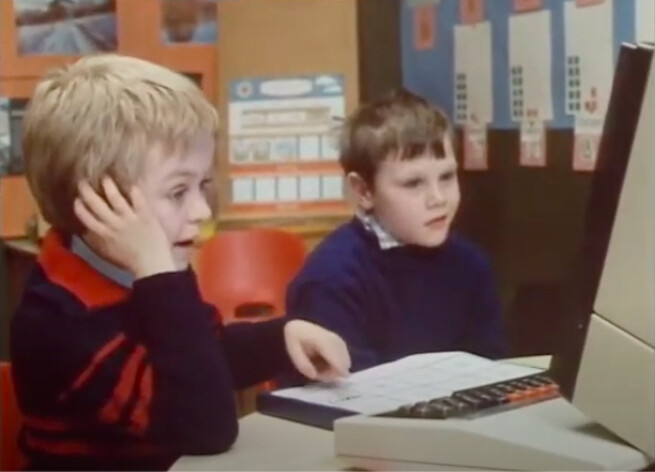Assistive technologies, often using microcomputers, seen in a six part series from the UK, aired 1985. Here’s the playlist.

Six programmes looking at the way computer based technology helped people with various kinds of disability.
May also be viewable here with navigation and description for each segment of each programme:
- Christopher’s Magic Cupboard… “Christopher is 4 years old. He’s bright, mischievous and full of life but he’s severely physically handicapped. Now, micro-technology is beginning to change his life, enabling him to do things the rest of us take for granted - learning, playing, getting about, communicating, and being naughty for the first time in his life.”
- Communicating… “the chip has given Michael Waelchli a voice. Patrick Murphy is deaf and blind, but he can now read, take notes, use the telephone, send and receive letters and get the latest news from his television. Young Julia Mason has never been able to speak or write - now for the first time she can communicate with the outside world.”
- Learning… “The chip can help blind children to learn Braille - and convert it to print for their teachers; it can help deaf children to learn language; good computer programs can stimulate and reward those with learning difficulties; and a combination of hardware, good programs and special switches can enable severely physically handicapped children to learn”
- Getting About… “A talking bus stop and wheelchairs that climb kerbs, that raise and lower, or that can be operated by two switches - the versatile chip is the key to all these. It can also improve muscle-control, and help you learn to drive”
- Working… “Kenny Matheson and Pat Magee both work from home, thanks to the chip; Rhoda Carratt is blind and holds down a secretarial job with the help of some enabling micro-technology; and a new information system on computer finds the best aid to help a person at work”
- Inventing… “follows the development of a number of different types of aid, from the Micromike, made in an airing-cupboard in the inventor’s home, to the Electronic Book, now marketed by Tandy. It looks at some of the pitfalls, the achievements and sources of help and advice.”
Computing itself is now a very popular hobby. After the initial enthusiasm for games has worn off, a computer club is a good place to seek advice and try out new projects. This wealth of talent and enthusiasm can be put to very good use. Runcorn, the North West computer club has been active in developing equipment and programs for disabled people.
(via OneSwitch posting on Stardot)